A Field Trip to eClinicalWorks 8/4/11
With the notable exceptions of HIMSS and MGMA, my HIStalk reporting rarely takes me away from my little laptop in my home office. Because a girl needs to get out now and then, I recently paid a visit to the brand new headquarters of eClinicalWorks in Westborough, MA. eCW moved to its new digs in May after spending over $18 million for the property and remodeling.
Sam Bhat, eCW’s VP of sales and one of the company’s five co-founders, was my host. About 600 employees work in the two-story facility, which includes customer training rooms, an employee cafeteria, lots of work surfaces (aka cubicles), and not too many offices.
CEO Girish Navani, who was traveling the day of my visit, has a 10×10 office. Outside, in open space adjoining several rows of cubicles, is a conference table where he and others conduct meetings. The design promotes transparency and collaboration and suggests the availability and willingness of execs to be in the trenches with their employees.

Though there are rows and rows of work spaces throughout the building, the walls of each cube are low. As a result, employees can sit at their desks and still see outside. The facility also has multiple break rooms with colorful walls and fun touches like the orange mobile-like structures hanging from the ceiling.
eCW also created multiple open areas that employees can use for meetings. Sam explained that the colors for these spaces are all slightly different (greens, oranges, blues) and suggest an East meets West theme. I don’t know about that, but I do know I liked the vibrant colors and the abundance of non-traditional work areas.
Because the facility is new, a few areas are still getting finishing touches. For example, an on-site gym for employees is opening soon. A few areas are also awaiting furniture or artwork, and I noticed several workmen doing their thing throughout my tour.
eCW has six customer training rooms as well as break areas specifically for clients. Customers enter the building through a separate entrance for security reasons. The office park has two hotels, which allows out-of-town customers (or employees) to literally walk across the street to attend classes or meetings.
eCW has several additional classrooms for internal employee training. On the day I was there, about 45 new hires were attending orientation and training. Sam told me most employees (at least in technical positions, implementation, and support) are recruited from graduate schools and typically have earned degrees in engineering or similar fields. The main hiring criterion is analytical ability.
I rounded out my visit with lunch at the employee cafeteria. The daily menu includes traditional American grub as well as an Indian entree. I went for the Indian, which was an excellent choice. OK, I must confess I really don’t know what I ate, although I know it was vegetarian and included rice and some sort of squash. It was delicious and a ton of food for an affordable $5.
The cafeteria has a huge screen and projector at either end. The space can be reconfigured as needed for large employee gatherings. In fact, Sam told me that a couple of weeks before move-in, a few dozen employees tried out the room and its AV setup to watch the world cricket finals at 5:30 a.m. on a Saturday.
eCW established the new headquarters to accommodate its rapid growth, but expects to outgrow the space in the next year or so, expecting to secure additional space in the same office park.
My conclusion is that the facility itself is lovely and functional, but not over the top. Its design reflects eCW’s culture, which strikes me as family-oriented and collaborative, with a heavy emphasis on transparency.
A big thank you to Sam and eCW for giving me a peek.

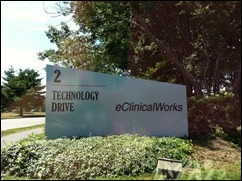





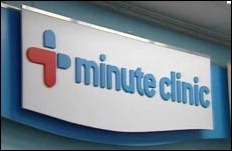




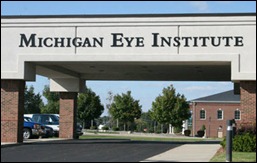




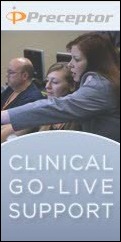

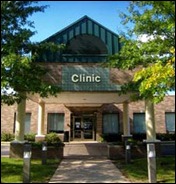
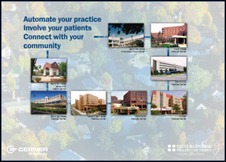

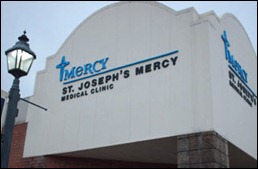


The article about Pediatric Associates in CA has a nugget with a potentially outsized impact: the implication that VFC vaccines…